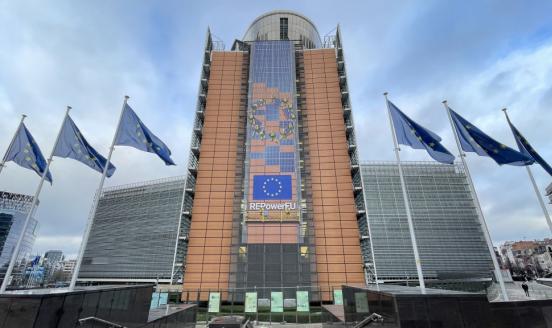Reforming decision-making for EU taxation policy
Pierre Moscovici, European Commissioner for Economic and Financial Affairs, Taxation and Customs, spoke at a Bruegel event on February 21, 2019.
Ladies and gentlemen,
Good afternoon,
I am very pleased to be with you this morning to discuss European taxation and in particular, the Commission’s communication calling for a move to qualified majority voting in tax matters.
With this communication, we are inviting Member States, the European Parliament and all stakeholders to engage in a debate on how to take more effective decisions in the very sensitive and strategic area of taxation. Very concretely, we propose the activation of the EU Treaty’s “passerelle clauses”. This would allow the use of qualified majority voting within the competences of the treaty and in full respect of subsidiarity.
I am convinced that the way in which tax rules are adopted in the European Union needs urgent modernisation. I am well aware that this position is not shared by every Member State - yet. It is possible that many of you here today do not share this view either. I would therefore like to discuss why we want to move gradually from unanimity to qualified majority voting in tax matters and why I consider that this change must happen rather sooner than later – to say the least!
I believe that maintaining the unanimity rule in tax matters raises four major problems.
First, the unanimity rule was a 20th century reflex. In the 21st century, it makes no sense! As early as the signing of the Treaty of Rome in 1957, the founding fathers and the Member States decided that taxation was an essential element of the internal market and decided, for that particular reason, to share their sovereignty over cross-border aspects of taxation. At the time, unanimity was the rule for all decisions between the six founding countries to protect national sovereignty.
But in 2019, more than 60 years later, this old-fashioned rule hasn’t changed and taxation remains the last bastion of unanimity. To be frank, I find it totally absurd and ineffective. It is surprising - and I am weighing my words - to observe that the unanimity rule is still the principle in tax matters, whereas qualified majority voting has become the norm in the EU, even for issues as politically sensitive as taxation, such as police cooperation or judicial cooperation in civil and criminal matters. Why have EU governments been able to move to QMV on the fight against terrorism in less than 20 years, but still fail to do the same on taxation?
Second, the unanimity rule is no longer protecting national sovereignty. Rather, it prevents the emergence of genuine European sovereignty in tax matters. The debate we have opened raises a profound political question: what are the threats to our tax sovereignty in the 21st century?
All we have to do is open our eyes and look around us! Is today’s biggest threat a hypothetical harmonisation of rates proposed by Brussels, which is by the way not possible under EU law? Or is it the aggressive tax planning organised on a large scale by many multinationals and third countries, which deprives Member States of massive public revenues? For me, the answer is clear. Today, the unanimity rule is no longer a bulwark but an obstacle: only a stronger ability to decide and act together at Union level through qualified majority voting can better protect our Member States.
I am fully aware that some Member States are using the sovereignty argument to oppose the transition to qualified majority voting. I am afraid it might be a flawed argument and a false excuse given by some Member States to preserve a tax framework that is on the edge of legality to attract the most affluent companies and citizens. In the long run, these models will have to change as they expose the huge external dependence of these economies and are damaging for the EU as a whole!
I urge all Member States to consider the general European interest. Should we leave the design of our tax systems in the hands of other global powers, other countries or global businesses – giving up on billions of tax revenues? Or do we want the emergence of a genuine European sovereignty that will guarantee a modern and fair tax framework for all? Once again, the answer is pretty clear and requires a more effective decision-making rule.
To be fair with Member States, they have strengthened the fight against fraud and tax evasion. During this mandate, we have succeeded in getting 12 directives to combat fraud and tax optimisation unanimously adopted.
However, some Member States are using this progress in the current debate as evidence that unanimity is not a problem. This is not correct. These decisions were possible only because of the huge political pressure on Member States to respond swiftly to tax scandals that were revealed by the press. And because many of these proposals had already been negotiated and agreed by EU Member States at the OECD, through the BEPS framework.
Defending unanimity is not the right state of mind: we cannot wait for the next tax scandal in order to move forward. On the contrary, we must use the political convergence that has slowly emerged between Member States on this subject as a springboard towards qualified majority voting. This is why tax fraud should be the first area where decisions could be made by qualified majority.
The third reason is that the unanimity rule costs billions of euros every year to European taxpayers, companies and Member States - mostly because of tax fraud and tax evasion, and the revenue gap. These are all resources that are not used to finance schools, broadband connections or climate actions throughout Europe. This is truly shameful!
On some important issues, which are costly for our societies, many of our proposals are blocked in the Council because unanimity cannot be found. The unanimity rule has hampered progress on important tax initiatives needed to strengthen the single market and boost EU competitiveness, with huge costs for our companies and tax revenues across the EU.
Let me give you two striking examples. Today, in the absence of an agreement on intra- Community VAT, 147 billion euros worth of VAT is not collected each year, including 50 billion euros due to cross-border fraud! Beyond the fight against revenue loss, some reforms that could help us to generate savings for businesses and boost growth in the EU are also still blocked! The introduction of a consolidated corporate tax base would allow the EU to add 1.2% to our growth and save more than 1 billion euros in administrative costs for our companies, which still have to deal with 28 different sets of accounting rules.
How long are we going to tolerate this situation? Member States have to act now!
Last but not least, the unanimity rule is a weakening of democracy. I wanted to conclude with this point because I know how crucial it is for all of us. In the last few years, the European Parliament has played a crucial political role in tax matters. I want to take this opportunity to pay tribute to its impressive work. The Parliament has been an ally of the Commission in the fight to reform European taxation and I have had very regular and fruitful exchanges within the framework of the special committees set up for this purpose.
However, even if Parliament has fully taken up this issue, its role remains only consultative when it comes to policy response. This is very clearly a problem of democracy and representation. It is abnormal – maybe even anti-democratic - that decisions that affect the lives of all European citizens are taken without any control over their elected representatives. Secondly, it raises a consistency issue with other EU policies. It is odd that the European Parliament has a say in the distribution of CO2 emissions between Member States but not in the tax incentives when it comes to renewables energy or polluting activities - which have to go hand in hand.
Tomorrow, if the transition to qualified majority voting is adopted, the European Parliament could be a co-legislator and the interests of all Europeans would be better represented. This seems crucial to me at a time when Europeans' desire for representation and thirst for democracy are so strong. Again, this is in line with history!
Ladies and gentlemen,
The change from unanimity to majority voting in tax matters would be a true innovation for the European Union's tax policy, which could finally reach its full potential! Today and in the coming months, the important thing is to have this discussion and encourage Member States to take a stand and be accountable to their citizens!
Thank you for your attention. I am ready to answer your questions.

